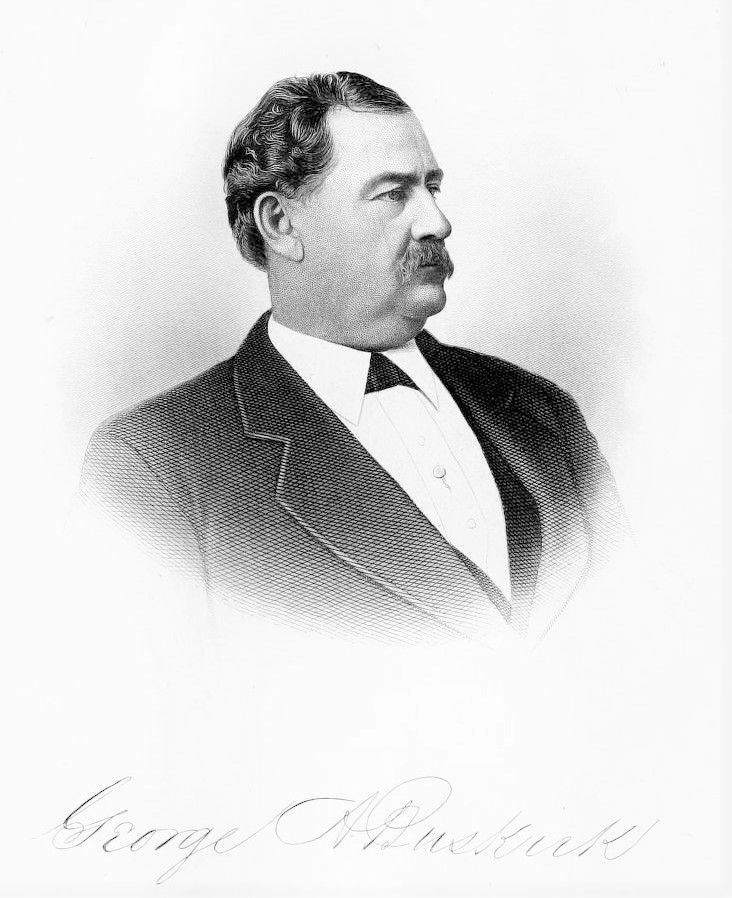Biographical Details
Date of Birth: August 10, 1829
Birth Location: Bloomington, IN, USA
Major Study: Law
Graduation Year(s): 1850
Degree(s) Earned: Bachelor of Laws
Date of Death: July 22, 1874
Death Location: Bloomington, IN, USA

Date of Birth: August 10, 1829
Birth Location: Bloomington, IN, USA
Major Study: Law
Graduation Year(s): 1850
Degree(s) Earned: Bachelor of Laws
Date of Death: July 22, 1874
Death Location: Bloomington, IN, USA
George Abraham Buskirk was born in Indiana, the fifth of six children, to George Abram Buskirk and Mary Boswell Buskirk. He had two older sisters and two older brothers. When he was two, his younger brother, Edward, was born. George Abraham Buskirk was one of three Buskirk brothers to receive law degrees from IU between 1845 and 1863. He was a printer and student of law in his brother's (Samuel H. Buskirk's) office. Buskirk was educated in Bloomington public schools and at IU, leaving while a freshman to enlist in the Mexican War. After the war he returned to finish his studies and graduated in 1850.
Buskirk was a lawyer, and he rose slowly to prominence with increasing responsibility. Soon after graduating from IU, he was elected Justice of the Peace. In 1856, he was elected Judge of Common Pleas Court for Monroe, Morgan, and Brown Counties. During the Civil War, he was appointed Colonel of the Indiana Legion and also Judge Advocate by the Governor of Indiana. In 1866, he was elected Representative to the State Legislature. Then in 1867, he was elected Land Agent of the State, and in this capacity, opened an office in New York, and had control of the funds for the payment of the Indiana state debt. In 1869, he was chosen Speaker of the Indiana House. While speaker, he strongly advocated the passage of the Fifteenth Amendment to the Constitution.
In August 1854, Buskirk married Martha Hardesty of Bloomington. They had five children. His daughter, Anna, remained and raised her family in Bloomington. His son, George Jr., was married three times, traveled frequently, and had a winter home in Bloomington. His daughter, Martha, died unmarried in Bloomington at age forty. His son, Philip, “traveled a great deal. . .covering the greater portion of this country” and also worked in law, banking, and especially the development and prosperity of the Bedford quarries.He became one of the wealthiest men in the city. His youngest son, Lawrence, appeared to have at some point changed his last name to “Van Buskirk” and later took over the bank his father had started.
Philip’s granddaughter, Mary Ellen Buskirk Chumley, whose name also appears on George Buskirk’s cemetery monument in Rose Hill Cemetery, had the Indiana Theater on Kirkwood Avenue in Bloomington named after her by the community in 1995, the Buskirk-Chumley Theater.Mary Ellen had a son, Gary Buskirk Chumley, who was a philanthropist.
In 1871, Buskirk organized the First National Bank in Bloomington. On July 2, 1873, in Bloomington, while he held the title of President of the First National Bank, he shot Aaron Rose, a bartender, in the heart, because he refused to sell him whiskey. The first time Buskirk asked for whiskey, Rose explained that he could not sell whiskey to him because Buskirk’s brother, Samuel, had personally requested him not to let Buskirk have any liquor. He asked Rose again, and the second time he refused, Buskirk shot him. The press said, “Buskirk had been drinking hard for several days. He is now in jail.” He was released on a $7,500 bond, avoiding prosecution. Rose was in critical condition, and several newspapers even reported that he was dead. However, the bullet was removed from near his spinal column two weeks later. In October, when Buskirk came to trial, he paid an additional $200 fine to settle the matter. Rose apparently had recovered enough that The Indianapolis News put on the front page that he publicly forgave Buskirk and refused to prosecute him.